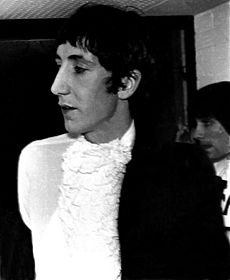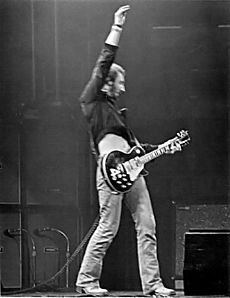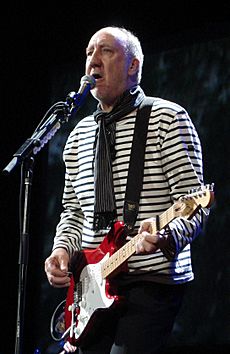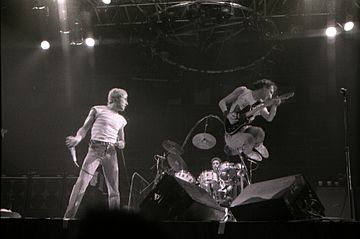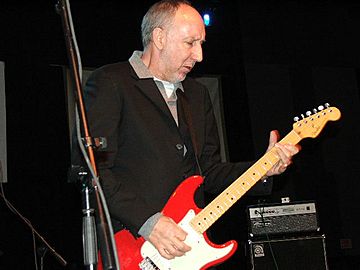Pete Townshend facts for kids
Quick facts for kids
Pete Townshend
|
|
|---|---|
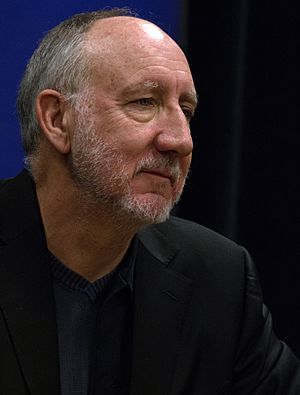
Townshend in 2012
|
|
| Background information | |
| Birth name | Peter Dennis Blandford Townshend |
| Also known as | Bijou Drains |
| Born | 19 May 1945 Chiswick, England |
| Origin | London, England |
| Genres | |
| Occupation(s) |
|
| Instruments |
|
| Years active | 1960–present |
| Labels | |
Peter Dennis Blandford Townshend (born 19 May 1945) is an English musician famous for being the main songwriter and guitarist for the rock band the Who. He is known as the main leader of the band, which became one of the most important rock groups of the 1960s and 1970s.
Townshend has written over 100 songs for The Who's 12 studio albums. He is famous for creating two rock operas, Tommy and Quadrophenia. He also wrote classic rock songs for albums like Who's Next. Besides his work with The Who, he has written over 100 songs for his own solo albums.
While he is best known as a guitarist, Townshend is a talented musician who can play many other instruments. He plays keyboards, banjo, accordion, ukulele, mandolin, and drums. He taught himself how to play all of them. He has also written many articles, books, and scripts.
Townshend has received many awards for his music. In 1990, he was welcomed into the Rock and Roll Hall of Fame as a member of The Who. He and his bandmate Roger Daltrey received The George and Ira Gershwin Award for Lifetime Musical Achievement in 2016. Many music magazines have called him one of the greatest guitarists of all time.
Contents
Early Life and First Guitar
Pete Townshend was born in Chiswick, a part of West London, England. He grew up in a musical family. His father, Cliff Townshend, was a professional saxophone player, and his mother, Betty, was a singer.
As a boy, Townshend loved reading adventure books like Gulliver's Travels and Treasure Island. His interest in rock and roll music started in 1956 after he saw the movie Rock Around the Clock. Soon after, he saw the famous singer Bill Haley in concert.
His grandmother bought him his first guitar for Christmas in 1956. His father taught him a few chords, but Townshend mostly taught himself how to play. He and his school friend John Entwistle started a jazz group called the Confederates. Townshend played the banjo, and Entwistle played the horn. But they both soon became more interested in rock and roll.
After high school, Townshend went to Ealing Art College to study graphic design. There, he met other future rock stars like Ronnie Wood of The Rolling Stones. In 1964, he left college to focus completely on his music career.
The Who: A Rock Revolution
Forming the Band
In 1961, Townshend's friend John Entwistle asked him to join a band called the Detours. The band was led by Roger Daltrey. At first, Daltrey was the rhythm guitarist, and Townshend was the lead guitarist. When the lead singer left, Daltrey took over as the singer, and Townshend became the only guitarist.
In 1964, the band found out another group was called the Detours, so they had to change their name. Townshend's roommate suggested "The Who," and Daltrey agreed it was the best choice. Soon after, they found a new drummer, Keith Moon, and the classic lineup of The Who was complete.
Smashing Guitars and Finding Fame
The Who quickly became known for their energetic and wild live shows. One night in 1964, Townshend accidentally broke the neck of his guitar on a low ceiling. Instead of stopping, he smashed the entire instrument on stage. The crowd loved it, and smashing guitars became a famous part of their concerts.
The band's first hit song was "I Can't Explain" in 1965. But it was their third single, "My Generation", that made them famous. The song, with its famous line "I hope I die before I get old," became an anthem for young people.
During their shows, Townshend developed a unique guitar-playing style. He would swing his arm in a full circle, like a windmill, before hitting the strings. This "windmill" move became his signature.
Rock Operas: Telling Stories with Music
Townshend wanted to do more than just write songs. He wanted to tell stories through music. In 1969, The Who released Tommy, a rock opera about a boy who is deaf, mute, and blind. The album was a huge success and was later turned into a movie and a Broadway musical.
The band performed Tommy at the famous Woodstock Festival in 1969. Their performance there is considered one of the most memorable in rock history.
In 1971, The Who released Who's Next, which became one of their most popular albums. It featured hit songs like "Baba O'Riley" and "Won't Get Fooled Again". These songs were some of the first to use synthesizers in rock music.
In 1973, Townshend wrote another rock opera called Quadrophenia. This album told the story of a young Mod in 1960s London. It was the only Who album written entirely by Townshend.
The Who continued to tour and make music for many years. Even after the deaths of Keith Moon in 1978 and John Entwistle in 2002, Townshend and Daltrey have kept the band going. They are still seen as one of the greatest live bands ever.
Solo Music and Other Projects
Besides his work with The Who, Townshend has released several solo albums. His first was Who Came First in 1972. His most successful solo album was Empty Glass in 1980, which included the hit single "Let My Love Open the Door".
He has also worked with many other famous musicians. He played with his hero Hank Marvin and other stars like David Gilmour and John Bonham in Paul McCartney's "Rockestra" band.
In 1993, he helped write and direct the Broadway musical version of Tommy, which won a Tony Award. He also co-produced the animated movie The Iron Giant, which was based on a book he had turned into a musical.
Townshend's Musical Style and Influence
Townshend is known for his aggressive guitar playing and his use of guitar feedback (a high-pitched sound created when a guitar is too close to an amplifier). Many famous guitarists, like Ritchie Blackmore of Deep Purple and Jimmy Page of Led Zeppelin, have said that Townshend was one of the first to use feedback as a musical tool.
His powerful chord playing and songwriting have influenced countless rock bands. Guitarists like Slash from Guns N' Roses and Steve Jones from the ... Pistols have cited him as a major inspiration.
Guitars and Equipment
Throughout his career, Townshend has used many different guitars, including models from Gibson, Fender, and Rickenbacker. Because he often smashed his guitars on stage, he started using cheaper, stronger models like the Fender Stratocaster for his performances.
In the late 1960s, he famously used a Gibson SG guitar, which he played at Woodstock. In the 1970s, he often used a Gibson Les Paul. Since the late 1980s, he has mostly played a special Fender Stratocaster designed for Eric Clapton.
Townshend also helped create the "Marshall stack". He asked amplifier maker Jim Marshall to build huge speaker cabinets. They were so big and heavy that Marshall cut them in half, creating the stackable speaker cabinets that are now a common sight at rock concerts.
Writing Books and Scripts
Townshend is also a talented writer. He has written articles for magazines like Melody Maker and Rolling Stone. In 1977, he started his own publishing company, Eel Pie Publishing, which released children's books and music books.
In 1983, he became an editor for the famous publisher Faber and Faber. He helped edit books by other musicians, like Eric Burdon of The Animals. In 1985, he published his own book of short stories called Horse's Neck.
He published his autobiography, Who I Am, in 2012. It became a bestseller. In 2019, he released his first novel, The Age of Anxiety.
Charity Work
Townshend has been involved in charity work for most of his career. He has helped raise money for many causes, especially for children's charities and organizations that help people with health problems.
In 1992, the first performance of the Tommy musical was a benefit for a music therapy foundation that helps children. He has also performed at benefit concerts for the Bridge School Benefit, which helps children with disabilities, and the Maryville Academy, a children's charity in Chicago.
As a member of The Who, he has helped raise millions of pounds for the Teenage Cancer Trust in the UK. In 2011, he and Roger Daltrey launched a special cancer program for teens and young adults at a hospital in Los Angeles.
Awards and Honors
- BRIT Awards 1983 – Life Achievement Award
- Tony Award 1993 – Best Original Score for The Who's Tommy
- Grammy Awards 1994 – Best Musical Show Album for The Who's Tommy
- Grammy Awards 2001 – Lifetime Achievement Award (with The Who)
- Ivor Novello Awards 2001 – Lifetime Achievement Award
- Kennedy Center Honors 2008 (with The Who)
- TEC Awards 2013 – Les Paul Award
- The George and Ira Gershwin Award 2016 – Lifetime Musical Achievement
Images for kids
See also
 In Spanish: Pete Townshend para niños
In Spanish: Pete Townshend para niños
 | Isaac Myers |
 | D. Hamilton Jackson |
 | A. Philip Randolph |


